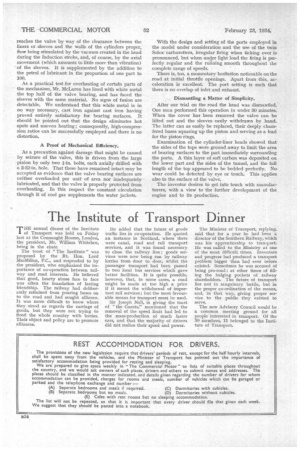The Institute of Transport limner
Page 48

If you've noticed an error in this article please click here to report it so we can fix it.
THE, annual dinner of the Institute of Transport was held on Friday last at the Connaught Rooms, London, the president, Mr. William Whitelaxv, being in the chair.
The toast of "The Institute " was proposed by the Rt. Hon. Lord MacMillan, P.C., and responded to by the president, who emphasized the importance of co-operation between railway and road interests. He believed that good, hearty abuse face to face was often the foundation of lasting friendship. The railway had deliberately refrained from pouring buses on to the road and had sought alliance. It was more difficult to know where they stood as regards the carriage of goods, but they were not trying to flood the whole country with lorries. Their object and policy are to promote alliances.
He added that the future of goods traffic lies in co-operation. He quoted an instance in Scotland, where there were canal, road and rail transport services, and it was found necessary to close the railway line; goods services were now being run by railway lorries from door to door, whilst the passenger transport had been passed to two local bus services which gave better facilities. It is quite possible, however, that, in some cases, a road might be made at too high a price if it meant the withdrawal of important rail services ; but the most favourable means for transport must be used.
Sir Joseph Nall, in giving the toast of "the Guests," mentioned that the removal of the speed limit had led to the rna-ss-production of much faster cars, and that the majority of drivers did not realize their speed and power.
The Minister of Transport, replying, said that for a year he had been a director of the Southern Railway, which was his apprenticeship to transport. He was called to the Ministry at one of the most difficult times. Inventors and progress had produced a transport problem bigger than had ever before existed. Sometimes he was accused of being pro-road ; at other times of filling the bulging pockets of railway shareholders. The future of transport lies not in sanguinary battle, but in the proper co-ordination of the means, and, in that way, giving proper service to the public they existed to serve.
The new Advisory Council would be _ a common meeting ground for all people interested in transport. Of the 30 members, 11 belonged to the Institute of Transport.




























































































